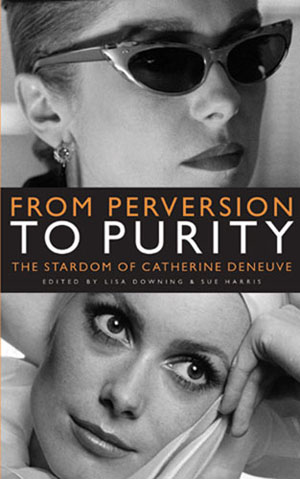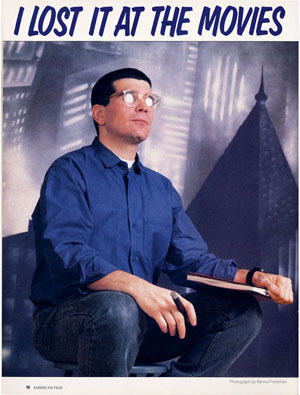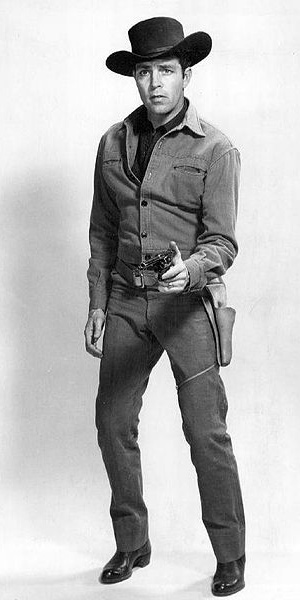This past week’s top story, and an infuriating one it is, too, broke on Wednesday: “The co-director and star of Iranian dissident filmmaker Jafar Panahi’s Berlin prizewinner Closed Curtain have had their passports confiscated by officials,” reports the Guardian‘s Ben Child. “The move means Kambuzia Partovi and actor Maryam Moghadam will no longer be able to go abroad to promote the winner of the 2013 Silver Bear for best screenplay. Panahi himself remains under house arrest in the Islamic Republic after being banned from making films for 20 years and sentenced to six years in prison in December 2010.” More from Graham Fuller at Artinfo.
Reading. Manohla Dargis, A.O. Scott, television columnist Alessandra Stanley, and video game critic Chris Suellentrop all contribute to the New York Times dossier Big Bang Theories: Violence on Screen.
Kevin B. Lee presents a primer on the evolving genre of the video essay as film criticism in Roger Ebert’s Journal.
“For more than three decades, Lewis Klahr has been among the most prolific and original avant-garde film and video artists in America,” writes Tony Pipolo at the top of a rather lengthy interview with the artist. “A running loop of his films is currently on view at the Los Angeles County Museum of Art (through month’s end), and on March 8 and 9 the Museum of the Moving Image in New York will present a substantial program of his digital work.”
Also in the new issue of Artforum, the recent flurry of Apple’s patents on a variety of “functional finger gestures” to be applied to touch screens has Alexander Provan returning to the late media theorist Vilém Flusser, who “recognized the movement toward a ‘society of image producers and image collectors’ that would ‘no longer be found in any place or time but in imagined surfaces, in surfaces that absorb geography and history.’ … Flusser believed that our gadgets might serve noble purposes if only we could reprogram them—which is to say reprogram ourselves, the users. Then we might engage in the socialized production of information (rather than in its vacuous circulation), leading to radical democratic structures. Play would replace work, and society would become a ‘school for freedom’ in which everyone is a creator and critic. But this cybernetic vision has famously become the domain of Silicon Valley venture capitalism, and instead of a ‘positive utopia’ we have the monetization of ‘valuable behaviors.’ In the patent wars we can glimpse a possible future in which all the fingertips and eyeballs of the world are united as workers in the everywhere-factory of the image.”
Fresh conversations in Interview: Aïda Ruilova with Abel Ferrara and Rachel Small with William Klein.
For 3:AM Magazine, Richard Marshall introduces an interview with the author of Film and Ethics: Foreclosed Encounters, among other books: “Lisa Downing gives us the deep scoobies about the problematic relationship between the aesthetical and the ethical, about Derrida, Levinas, Lacan and Foucault, feminism, queer theory, pornography, and post-modernism. She is intrigued by film director Patrice Leconte and the birth of necrophilia and other perversion-types in French literature of the nineteenth century. She gets jiggy about the death-drive and its importance to ‘shadow feminism,’ and the various images of Catherine Deneuve. She traces the way ‘queer’ has become a badge of resistance as she worries about the dangers of a Western supremacist discourse. Her new book [The Subject of Murder] is about murderers and how the idea that they are ‘exceptional figures’ has a deeply conservative function. All in all, this is one hell of a turgentimous blast.”
“Watching Sophie Fiennes and Slavoj Zizek‘s The Pervert’s Guide to Cinema (2006) again,” writes Michael Atkinson at Sundance NOW, “this time with my crit-theory class of suburban undergrads, for whom the massive Zizekian harangue is something like their body-blow introduction to authentically creative and active movie-watching, I became bewitched not with the fun-loving Lacanian cant, nor Zizek himself, nor, oddly, with the films he excerpts—the magisterial entireties of Vertigo, Blue Velvet, Mulholland Dr., The Great Dictator, Duck Soup, The Birds, Trois Couleurs: Bleu, The Conversation, Psycho, and so on. No, what I realized is that, however much I may treasure those films, and did in fact feel that urging rush of ardor for them you get when you’re with someone who has yet to see them, I may love them more as fragments, as flashes of brilliant psychodramatic imagery. As each potent scene was conjured up and presented out of its original context, as quick cataracts of feeling, symbology and saturated narrativity, I found myself wondering if this was the best form for cinema to take.”
Meantime, as Nick Pinkerton drives across the continent, he’s got the great Midwestern films on his mind, two by Minnelli and the other by Welles.
At Ballardian: “Tacita Dean‘s new film, JG, is currently on view at the Arcadia University Art Gallery, Glenside, Philadelphia. The film is inspired by Dean’s correspondence with J.G. Ballard, and explores connections between Ballard’s short story ‘The Voices of Time’ and Robert Smithson’s iconic earthwork and film Spiral Jetty. To celebrate this important new work, Andrew Frost explores the enduring and mysterious relationship between Ballard, Smithson and Dean.”
The new issue of American Film features an interview with composer Danny Elfman, Paul Schrader‘s reflections on Travis Bickle, and from the archives, David Mamet‘s 1987 piece on two “very different experiences,” directing House of Games and writing Brian De Palma’s The Untouchables.
“Compared to flashier series such as Girls and Homeland, Enlightened, now finishing its second season, has been slow to find its audience,” writes Francine Prose for the New York Review of Books. “People complain—understandably—that the show makes them anxious, and few viewers may want to admit to having anything in common with a forty-year-old, divorced, basement-level corporate worker, living at home with Mom. But what’s most surprising about Enlightened is the intensity with which Amy and her friends get to us, how much of ourselves we may see in them, if we only have the temerity to allow it.” Amy Jellicoe is played by Laura Dern, who co-created the HBO series with Mike White, recently interviewed by Elvis Mitchell. For more on Enlightened, see Jane Hu in the Los Angeles Review of Books and listen to this week’s Culture Gabfest at Slate.
In the works. David Lynch is probably writing a new screenplay, as the Playlist‘s Kevin Jagernauth reports. Let’s hope so; we’ve loved the shorts and the album and all, but it’s been seven years since Inland Empire. Meanwhile, the Hollywood Reporter‘s Gregg Kilday confirms that Lynch has agreed to take on a role in his daughter Jennifer’s new feature, A Fall from Grace.
Neil Gaiman’s next novel, The Ocean at the End of the Lane, won’t be out until June, but an adaptation is coming together and Joe Wright will likely direct it. Deadline‘s Mike Fleming Jr. has more. Also: “Gary Oldman is joining Dawn of the Planet of the Apes, the Matt Reeves-directed sequel to Fox’s successful ape reboot… Zero Dark Thirty‘s Jason Clarke and Kodi-Smit McPhee have already been set. I’m told that Oldman will play Dreyfus, leader of the human resistance after the apes have taken power.”
From Andrew Pulver: “Harry Potter alumni Emma Watson and Daniel Radcliffe are lining up leading roles in two new versions of well-known tales: Cinderella and Frankenstein respectively.” Also in the Guardian, Ben Child: “Bradley Cooper could become the latest actor to go behind the cameras after signing on to star in and potentially direct a Warner Bros remake of the German blockbuster Kokowääh.” Good luck with that, Mr. Cooper.
Obits. “In Hollywood, in the days when men were men, Dale Robertson, who has died aged 89, was considered the epitome of masculinity,” writes Ronald Bergan for the Guardian. “In the ‘Clarion Call’ episode from O. Henry’s Full House (1952), a giggling, sniveling crook, played by Richard Widmark, whom Robertson, a cop, has come to arrest, keeps calling him ‘the beeg man.’ Robertson, an ex-prize fighter, was indeed ‘beeg’—tall, well-built and ruggedly handsome, with a gravelly voice. He was tough but fair to men, and courteous to ladies, particularly in the many westerns in which he starred in the 1950s, and in his most famous role, that of special investigator Jim Hardie in the TV series Tales of Wells Fargo.”
“Italian musician and composer Armando Trovajoli—who wrote the scores for about 300 films—has died aged 95,” reports the BBC. “During a long career he worked with some of the world’s great jazz musicians, including Duke Ellington, Louis Armstrong and Miles Davis.”
“Bonnie Franklin, who played divorced single mom Ann Romano for nine seasons on Norman Lear’s One Day at a Time, has died,” reports Josef Adalian for Vulture. “Franklin’s Ms. Romano was part of a wave of strong female TV icons that rose up during the 70’s and 80’s: Maude Findlay, Alice Hyatt, Florida Evans, Mary Richards. What was special about One Day at a Time was that Franklin played a single mom by choice (she was one of the earliest small screen divorcees), and that the show never sugar-coated the challenges of raising kids solo.”
More browsing? Check in with the cinetrix and John Wyver.
For news and tips throughout the day every day, follow @KeyframeDaily on Twitter and/or the RSS feed. Get Keyframe Daily in your inbox by signing in at fandor.com/daily.







